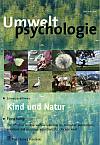Artikeldetails
 Yasmin Goudarzi, Torsten Hoke, Ulrich Gebhard, (2021),
Yasmin Goudarzi, Torsten Hoke, Ulrich Gebhard, (2021),Natur für alle
Naturerfahrungen mit „bildungsbenachteiligten“ Kindern und Jugendlichen (Praxisbericht).
Umweltpsychologie 25(2), 74-96.
Dieser Artikel wurde in deutsch verfasst.
| Zusammenfassung: | Die Natur ist für den Menschen eine Ressource des Wohlbefindens und der Erholung. Allerdings ist der tatsächliche und mentale Zugang zur Natur nicht für alle Menschen gleichermaßen möglich. Naturräume sind ungerecht verteilt oder werden auf Grund eingeschränkter Wahrnehmung nicht immer als persönliche Ressource angesehen. In dieser Hinsicht existiert in Deutschland eine Art von Umweltungerechtigkeit, die stark mit sozialer Ungleichheit einhergeht. Vor diesem Hintergrund geht es in dem Projekt um die Entwicklung einer Konzeption zur Naturerfahrung für „bildungsbenachteiligte“ Kinder und Jugendliche. Durch Reflexion von Selbst- und Weltverhältnissen, den genussvollen Umgang mit Natur als Lebensbereicherung und die Teilhabe an partizipativen Gruppen- und Gesellschaftsprozessen sollen Kinder und Jugendliche an die Natur herangeführt werden und damit zugleich ihre individuelle und gesellschaftliche Handlungsfähigkeit erweitern. Über ein Schuljahr wurden mit verschiedenen Gruppen Naturerfahrungen durchgeführt, die auf der Naturerfahrungspädagogik, dem Erfahrungslernen, dem Ansatz der Alltagsphantasien und der Demokratiebildung basieren. Die naturpädagogischen Angebote wurden evaluiert und hinsichtlich der Wirkzusammenhänge untersucht. Dazu wurden unterschiedliche Erhebungsmethoden (Gruppendiskussion, Fragebögen, Beobachtungsprotokolle) eingesetzt. Die Ergebnisse der quantitativen und qualitativen Erhebungen sprechen für einen persönlichen Gewinn aller beteiligten Kinder und Jugendlichen hinsichtlich der Nutzung der Natur als Erfahrungsraum und als Lebensbereicherung. |
| Schlagworte: | Bildungsbenachteiligung Gutes Leben Naturerfahrung Partizipation Umweltgerechtigkeit |
| Abstract: | Nature is a resource of well-being and recreation for humans. However, actual and mental access to nature is not the same for all people. Natural spaces are unequally distributed or are not always seen as a personal resource due to limited perception. In this respect, a kind of environmental injustice exists in Germany that is strongly associated with social inequality. Against this background, the project is concerned with the development of a concept for the experience of nature for "educationally disadvantaged" children and young people. Through sustainability-related reflexivity of self and world relationships, the enjoyable use of nature as an enrichment of life, and participation group and social processes, children and adolescents should be introduced to nature and thus at the same time expand their individual and social capacity to act. Over the course of a school year, nature experiences were carried out with various groups, based on nature education, experiential learning, the everyday myths approach and democracy education. The nature education offers were evaluated and examined with regard to the interrelationships of effects. For this purpose, different survey methods (group discussion, questionnaires, observation protocols) were used. The results of the quantitative and qualitative surveys indicate a personal gain for all children and young people involved with regard to the use of nature as a space for experience and as an enrichment of life. |
| Keywords: | Educational Disadvantage Environmental Justice Experience Of Nature Good Life Participation |
Zum Inhaltsverzeichnis

